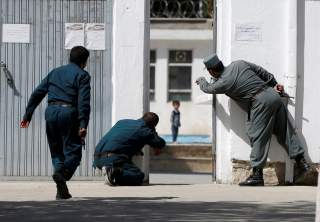The Politics of Washington Have Wrecked Afghanistan's Future
Afghanistan’s old wounds—no longer bandaged by U.S. dollar bills—are opening once again.
Upcoming parliamentary and presidential polls are key to renewing the central government’s legitimacy. But the electoral process will also deepen Afghanistan’s ethnic and regional cleavages. In all likelihood, Afghanistan’s 2019 presidential elections, should they even take place, will boil down to a two-man race: Gulbuddin Hekmatyar on one side and a non-Pashtun on the other. With the specter of a Hekmatyar presidency, non-Pashtuns will revert not just to the ballot, but also the bullet.
If—or perhaps more accurately, when—the conflict in Afghanistan escalates over the next two years, it could bleed further into neighboring states, two which have hosted millions of Afghan refugees for four decades.
The Afghan war has dramatically changed the fabric of Pakistani society. Many Pakistanis, including top officials, regret their country’s participation in the anti-Soviet jihad. Since the summer, Pakistan’s civilian and military officials have consistently issued the same message to Washington: “Afghanistan war cannot be fought on Pakistani soil.” They show no inclination to sign up for a forever war. Instead, they want to engage the United States as a partner in producing a framework for a peace in Afghanistan that lasts beyond the attention spans of American political appointees and bureaucrats. In the absence of such a framework—which would involve enhancing border security, refugee repatriation, and reconciliation with the Taliban—the Pakistanis feel they need a plan B. Similarly, the Iranians and Russians engage the Taliban as they watch ISIS grow in their backyard, aided by the machinations of Afghan intelligence and Ghani’s misguided wars with warlords.
America’s plan A in Afghanistan ought to be a push for a regional solution to the conflict. The absence of such consultations—combined with the unraveling of Afghanistan—is actually deepening the anxieties of regional states about America’s actual aims in the country, where it has committed to an indefinite military presence.
There is growing opinion that the chaos in Afghanistan is by design—to justify a long-term U.S. presence to counter China, Iran and Pakistan, in concert with India.
In an interview with Russia Today, Hamid Karzai alleged that the United States was providing logistical support to ISIS in Afghanistan—a claim repeatedly made by Russian officials and some local Afghan power brokers. Oddly, the CIA-backed Taliban splinter Mullah Rasool group has issued a statement decrying the main Taliban group as Tehran-backed as the two groups battle near the border with Iran. In the wake of Secretary of Defense James Mattis’s criticism of the Belt and Road Initiative, Karzai also claimed that U.S. policy has now “realigned” as “more a power game than a fight against extremism,” cautioning India not to join an American conflict with China and Pakistan.
America has all the reason to work with Afghanistan’s neighbors and regional powers to prevent the emergence of a nasty hybrid ethnic, regional and sectarian war. But robust multilateralism goes against the instincts of Trump and his generals. And that is why if I were a betting man, I would make a wager that the Trump-Pence imbroglio in Afghanistan does not end well.
Arif Rafiq (@arifcrafiq) is president of Vizier Consulting, LLC, a political risk advisory company specializing in the Middle East and South Asia, and a nonresident fellow at the Middle East Institute.
Image: Afghan policemen try to rescue a child at the site of a suicide attack followed by a clash between Afghan forces and insurgents after an attack on a Shi'ite Muslim mosque in Kabul, Afghanistan, August 25, 2017. REUTERS/Omar Sobhani

